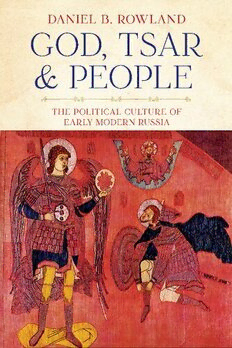
God, Tsar, and People: The Political Culture of Early Modern Russia PDF
Preview God, Tsar, and People: The Political Culture of Early Modern Russia
GOD, TSAR, AND PEOPLE A volume in the NIU Series in Slavic, East Eu ro pean, and Eurasian Studies Edited by Christine D. Worobec For a list of books in the series, visit our website at cornellpress . cornell . edu. GOD, TSAR, AND P EOPLE THE PO LITI CAL CULTURE OF EARLY MODERN RUS SIA Daniel B. Rowland NORTHERN ILLINOIS UNIVERSITY PRESS AN IMPRINT OF CORNELL UNIVERSITY PRESS Ithaca and London Copyright © 2020 by Cornell University All rights reserved. Except for brief quotations in a review, this book, or parts thereof, must not be reproduced in any form without permission in writing from the publisher. For information, address Cornell University Press, Sage House, 512 East State Street, Ithaca, New York 14850. Visit our website at cornellpress . cornell . edu. First published 2020 by Cornell University Press Library of Congress Cataloging- in- Publication Data Names: Rowland, Daniel B. (Daniel Bruce), 1941– author. Title: God, Tsar, and people : the po liti cal culture of early modern Rus sia / Daniel B. Rowland. Description: Ithaca [New York] : Cornell University Press, 2020. | Series: NIU series in Slavic, East Eu ro pean, and Eurasian studies | Includes bibliographical references and index. Identifiers: LCCN 2020011767 (print) | LCCN 2020011768 (ebook) | ISBN 9781501752094 (cloth) | ISBN 9781501753725 (paperback) | ISBN 9781501752100 (epub) | ISBN 9781501752117 (pdf) Subjects: LCSH: Po liti cal culture— Russia. | Russia— Intellectual life. | Moscow (Russia)— Kings and rulers. Classification: LCC DK32.7 .R69 2020 (print) | LCC DK32.7 (ebook) | DDC 306.20947/09031— dc23 LC rec ord available at https:// lccn . loc . gov / 2020011767 LC ebook rec ord available at https:// lccn . loc . gov / 2020011768 Cover image: Battle standard with images of Joshua, the Archangel Michael, and the Lord Sabaoth, early seventeenth century, Tretiakov Gallery. Source: N. Maiasova, Drevnerusskoe shit’e (Moscow: Iskusstvo, 1971), plate 54. To Wendy Contents Acknowl edgments ix A Brief Note on Transliteration and Our Editorial Policy xiii Foreword: Pathbreaking and Paradigm- Shifting by Russell E. Martin xv The Textual: Breaking the Code 1. Kurbskii and the Historians 3 2. T oward an Understanding of the Po liti cal Ideas in Ivan Timofeev’s Vremennik 23 3. The Prob lem of Advice in Muscovite Tales about the Time of Trou bles 54 4. Did Muscovite Literary Ideology Place Limits on the Power of the Tsar (1540s–1660s)? 82 5. The Memory of Saint Sergius in Sixteenth- Century Rus sia 115 Adding the Visual: Investigating Art and Architecture 6. Biblical Military Imagery in the Po liti cal Culture of Early Modern Rus sia: The Blessed Host of the Heavenly Tsar 127 7. Moscow— The Third Rome or the New Israel? 155 viii Contents 8. Architecture and Dynasty: Boris Godunov’s Uses of Architecture, 1584–1606 188 9. Two Cultures, One Throne Room: Secular Courtiers and Orthodox Culture in the Golden Hall of the Moscow Kremlin 211 10. Architecture, Image, and Ritual in the Throne Rooms of Muscovite Rus sia 234 11. Advice, Advisers, and Courtiers: Decision Making and Advice in the Royal Book Volume of the Illustrated Chronicle Compilation 259 12. Ivan the Terrible as a Carolingian Re nais sance Prince 299 Summing Up: What Our Work Means 13. Autocracy 315 14. Muscovy 319 15. God, Tsar, and People: Some Further Thoughts 358 Index 389 Acknowle dgments Any scholar who has been active over a period of almost five dec ades would have accumulated major debts to his or her col- leagues in the field. But in my case, my colleagues in the field of Muscovite history have had an unusual degree of influence over my work. Over t hese de cades, we have puzzled together over the same or similar prob lems, start- ing with what to make of the picture of Muscovite culture and politics that we inherited from earlier generations. Each of us charted his or her own course, examined dif er ent types of evidence, and came to separate conclu- sions. But, as we presented our research and commented on each other’s pa- pers yearly at the conferences of the American Association for the Advancement of Slavic Studies, now renamed the Association for Slavic, Eastern Eu ro pean, and Eurasian Studies, and in numerous other venues, both formal and informal, we felt part of a common undertaking: the creation of a new paradigm in our understanding of that time and place. In that extraordinarily fertile and long- lasting environment, it is hard for me to say where my own ideas end and t hose of my colleagues begin. So my first acknowle dgment is to all of my colleagues in early modern Rus sian history without whose work virtually none of these essays would be the same. Among this scholarly family, I am indebted particularly to a small handful of friends and colleagues who have been of special help, and whose influence on t hese essays is particularly g reat. The last essay in this volume explores this influence in substantive terms, but I can here express my personal gratitude to t hese friends. First, to Bob Crummey and Ned Keenan, whose guidance was essential to my formation as a historian of Muscovy. My longest-l asting friend- ship in the field is with Don Ostrowski. He put me up on his floor or couch during my earliest visits to Harvard, and we have discussed intensely and at length both issues in early modern history and prob lems we encountered in our teaching of the history of vari ous places and periods. As I wrote in the final essay here, Nancy Shields Kollmann, Russ Martin, Valerie Kivelson, and Michael Flier have had direct and continuing influence on my thinking. Together t hese scholars have rei magined many, even most ix
